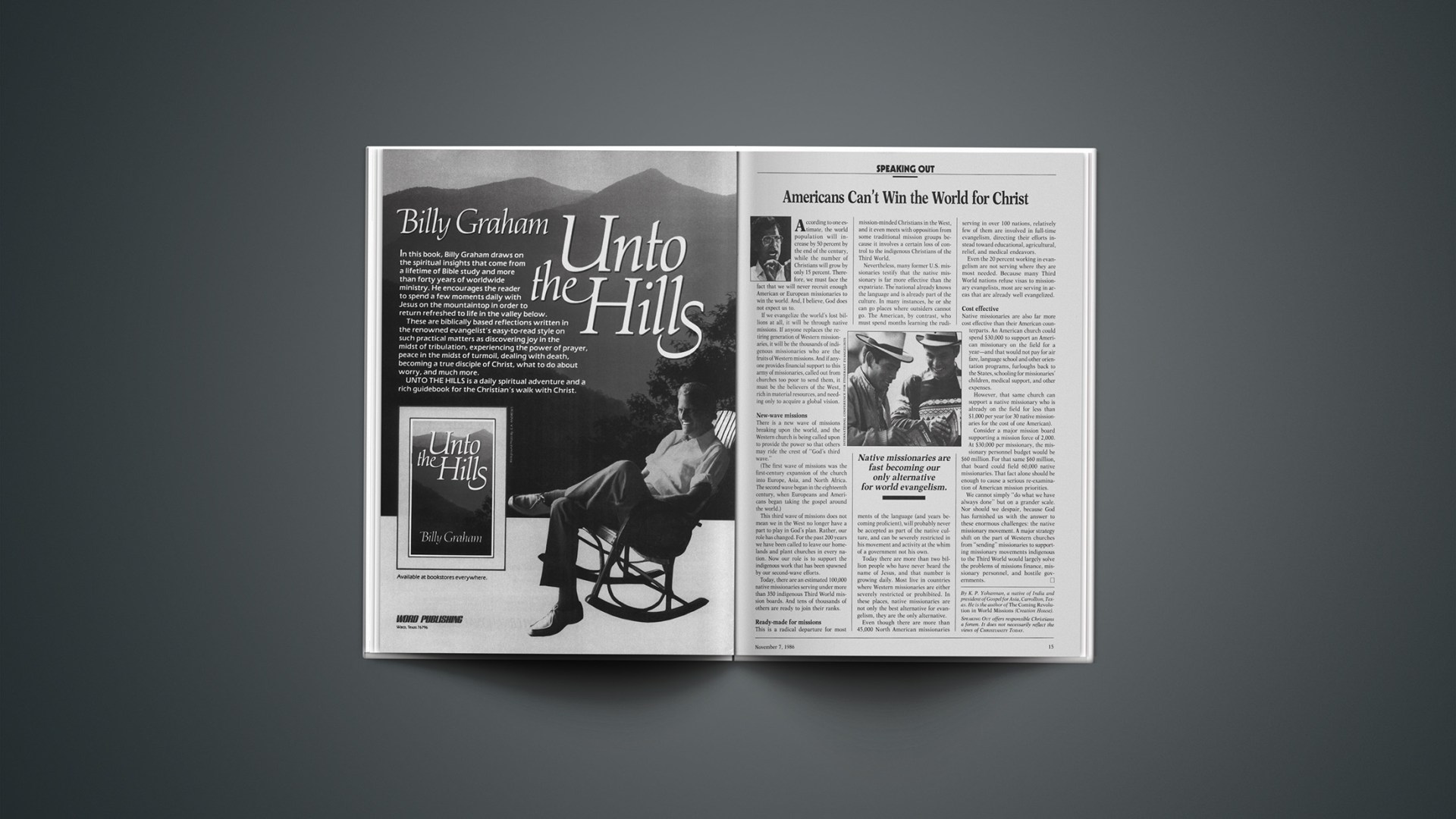According to one estimate, the world population will increase by 50 percent by the end of the century, while the number of Christians will grow by only 15 percent. Therefore, we must face the fact that we will never recruit enough American or European missionaries to win the world. And, I believe, God does not expect us to.
If we evangelize the world’s lost billions at all, it will be through native missions. If anyone replaces the retiring generation of Western missionaries, it will be the thousands of indigenous missionaries who are the fruits of Western missions. And if anyone provides financial support to this army of missionaries, called out from churches too poor to send them, it must be the believers of the West, rich in material resources, and needing only to acquire a global vision.
New-Wave Missions
There is a new wave of missions breaking upon the world, and the Western church is being called upon to provide the power so that others may ride the crest of “God’s third wave.”
(The first wave of missions was the first-century expansion of the church into Europe, Asia, and North Africa. The second wave began in the eighteenth century, when Europeans and Americans began taking the gospel around the world.)
This third wave of missions does not mean we in the West no longer have a part to play in God’s plan. Rather, our role has changed. For the past 200 years we have been called to leave our homelands and plant churches in every nation. Now our role is to support the indigenous work that has been spawned by our second-wave efforts.
Today, there are an estimated 100,000 native missionaries serving under more than 350 indigenous Third World mission boards. And tens of thousands of others are ready to join their ranks.
Native missionaries are fast becoming our only alternative for world evangelism.
Ready-Made For Missions
This is a radical departure for most mission-minded Christians in the West, and it even meets with opposition from some traditional mission groups because it involves a certain loss of control to the indigenous Christians of the Third World.
Nevertheless, many former U.S. missionaries testify that the native missionary is far more effective than the expatriate. The national already knows the language and is already part of the culture. In many instances, he or she can go places where outsiders cannot go. The American, by contrast, who must spend months learning the rudiments of the language (and years becoming proficient), will probably never be accepted as part of the native culture, and can be severely restricted in his movement and activity at the whim of a government not his own.
Today there are more than two billion people who have never heard the name of Jesus, and that number is growing daily. Most live in countries where Western missionaries are either severely restricted or prohibited. In these places, native missionaries are not only the best alternative for evangelism, they are the only alternative.
Even though there are more than 45,000 North American missionaries serving in over 100 nations, relatively few of them are involved in full-time evangelism, directing their efforts instead toward educational, agricultural, relief, and medical endeavors.
Even the 20 percent working in evangelism are not serving where they are most needed. Because many Third World nations refuse visas to missionary evangelists, most are serving in areas that are already well evangelized.
Cost Effective
Native missionaries are also far more cost effective than their American counterparts. An American church could spend $30,000 to support an American missionary on the field for a year—and that would not pay for air fare, language school and other orientation programs, furloughs back to the States, schooling for missionaries’ children, medical support, and other expenses.
However, that same church can support a native missionary who is already on the field for less than $ 1,000 per year (or 30 native missionaries for the cost of one American).
Consider a major mission board supporting a mission force of 2,000. At $30,000 per missionary, the missionary personnel budget would be $60 million. For that same $60 million, that board could field 60,000 native missionaries. That fact alone should be enough to cause a serious re-examination of American mission priorities.
We cannot simply “do what we have always done” but on a grander scale. Nor should we despair, because God has furnished us with the answer to these enormous challenges: the native missionary movement. A major strategy shift on the part of Western churches from “sending” missionaries to supporting missionary movements indigenous to the Third World would largely solve the problems of missions finance, missionary personnel, and hostile governments.
By K. P. Yohannan, a native of India and president of Gospel for Asia, Carrollton, Texas. He is the author of The Coming Revolution in World Missions (Creation House).
SPEAKING OUT offers responsible Christians a forum. It does not necessarily reflect the views of CHRISTIANITY TODAY.










